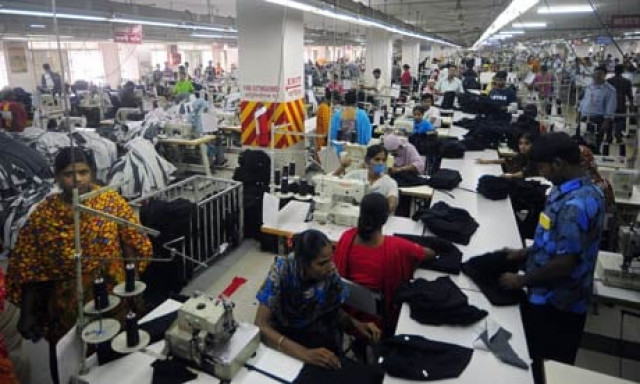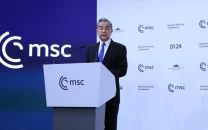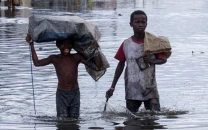Bangladesh unions rap Primark's compensation move
Primark said on Monday it would start paying out $9 million this week to the families of 580 dead or injured workers.

File photo of a garment factory in Bangladesh. PHOTO: AFP/FILE
Primark was one of more than two dozen Western retailers who had orders at the Rana Plaza factory complex that collapsed on the outskirts of the capital Dhaka in April last year, killing 1,135 workers and injuring more than 1,500.
Primark announced on Monday it would start paying out $9 million this week to the families of 580 dead or injured workers who worked for its supplier New Wave Bottoms, one of the five factories based at the Plaza.
The payments being arranged through Primark's local partners "will be met in full, in cash", it said, adding that it would contribute another $1 million to an UN-backed fund which aims to raise $40 million to compensate all the families of dead and injured workers.
While New Wave Bottom workers welcomed the compensation, Bangladeshi unions and manufacturers Tuesday criticised Primark's unilateral move, saying it could sow discord and spark protests.
Roy Ramesh, head of the Bangladesh chapter of global labour group IndustriaALL, said the retailer's plan to compensate workers without going through the International Labour Organisation (ILO) and other agencies meant hundreds of other victims would receive nothing.
"It should have contributed to the ILO-chaired fund to ensure that all the victims and their families had their share," Ramesh told AFP.
"Not only the ILO, Primark is also bypassing the government, the garment manufacturers' association and the labour unions, although the retailer itself is a part of the ILO-chaired initiative," he said.
Primark, which is the first company to finalise compensation arrangements, believes it only has a responsibility to those workers who were stitching its clothes, not to everyone in Rana Plaza.
Kalpona Akter, head of the Bangladesh Centre for Worker Solidarity, said the separate initiative "might create problems for the whole compensation campaign".
Bangladesh Garment Manufacturers and Exporters Association spokesman Shahidullah Azim also weighed in, saying families of all the deceased and injured workers should have their share in any compensation package.
While the Rana Plaza tragedy shed unprecedented light on the poor safety conditions and wages in the world's second-largest garment industry after China, Bangladesh authorities and Western retailers have yet to come up with a formula to compensate the victims.
Since the disaster nearly 200 Western retailers from Europe and America have formed two umbrella groups to launch safety inspections in the country's 3,500 garment factories, but only a few have committed to compensate the workers.
Last week local and international labour and rights groups urged the 27 brands linked to the doomed Rana Plaza factories to contribute to the ILO-backed fund before the first anniversary of the tragedy on April 24.



















COMMENTS
Comments are moderated and generally will be posted if they are on-topic and not abusive.
For more information, please see our Comments FAQ